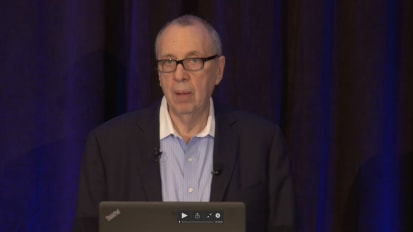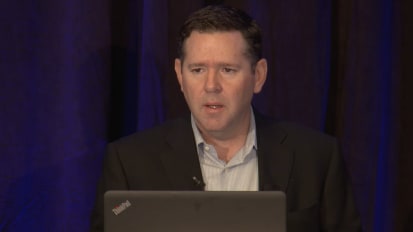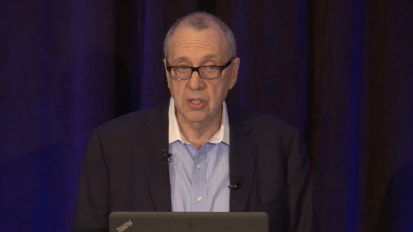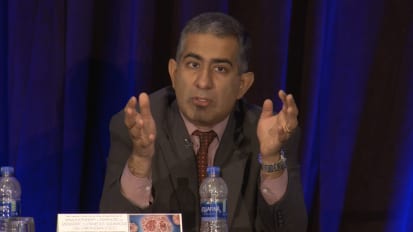Immunotherapy in Advanced and Metastatic Cutaneous Squamous Cell Carcinoma (CSCC)
Expanding the Immunotherapeutic Toolkit for Late Stage Skin Cancer
Focus on the Rationale and Evidence-Based Role for PD-1 Targeted Immune Checkpoint Inhibition-Defining Unmet Needs in a Challenging Patient PopulationOptimizing Survival and Clinical Outcomes in Metastatic CSCC
What Do Landmark Trials Teach Us About the Efficacy and Safety of PD-1 Targeting Immunotherapy in CSCC? Which Patients? When? For How Long? With What Results? -From Trial-Based Data to the Front Lines of Clinical Care in Patients with Advanced Skin CancerInteractive (ARS) Case Management and Dialogue Sessions Focused on Patient Case Management
Navigating the Immunotherapy Clinical Decision Tree in CSCC-Identifying Appropriate Candidates for PD-1 Checkpoint Inhibitor and Practical- Timing and Patient Selection- Aspects of Deploying ImmunotherapyWhich Patients with Advanced CSCC Will Likely Benefit Most from PD1 Checkpoint Inhibition?
A Best Practice, Evidence-Supported Roadmap for Dermatology SpecialistImmunotherapy in Advanced and Metastatic Cutaneous Squamous Cell Carcinoma (CSCC)
Program Medium
Internet-based program
Estimated Time to Complete Educational Activity
1.5 hours
Course Overview
In this web-based program, physicians will learn how recent developments in multimodal therapies have advanced the management of advanced and metastatic cutaneous squamous cell carcinoma (CSCC)
Release Date
November 30, 2018
Expiration Date
November 30, 2020
Method of Physician Participation Utilized in Learning Process
There are no fees for participating and receiving CME credit for this activity. During the period November 30, 2018 to November 30, 2020 participants must:
1) read the learning objectives and faculty disclosures;
2) study the educational activity, and are expected to view all 6 segments totaling 1.5 hours to successfully complete the activity and earn CME credit;
3) register and complete the evaluation form and post-test;
4) score 100% on the post-test; and
5) print out your CME certificate.
Registration
Participation in this WebCAST is complimentary, and clinicians are invited to view this CME-certified program and/or share this invitation with other colleagues, departmental staff members, and healthcare professionals.
Grantor Support
This activity is supported by an independent medical education grant from Regeneron Pharmaceuticals, Inc and Sanofi Genzyme
Accreditation Statement
This activity has been planned and implemented in accordance with the accreditation requirements and policies of the Accreditation Council for Continuing Medical Education (ACCME) through the joint providership of the Postgraduate Institute for Medicine and CMEducation Resources, LLC. Postgraduate Institute for Medicine is accredited by the ACCME to provide continuing medical education for physician.
Credit Designation Statement
Postgraduate Institute for Medicine designates this enduring material for a maximum of 1.5 AMA PRA Category 1 Credits(s)™. Physicians should claim only the credit commensurate with the extent of their participation in the activity.
Policy on Faculty & Provider Disclosure
Postgraduate Institute for Medicine requires instructors, planners, managers and other individuals who are in a position to control the content of this activity to disclose any real or apparent conflict of interest (COI) they may have as related to the content of this activity. All identified COI are thoroughly vetted and resolved according to Postgraduate Institute for Medicine policy. The existence or absence of COI for everyone in a position to control content will be disclosed to participants prior to the start of each activity.
Other Credits
American Nurses Credentialing Center (ANCC) accepts AMA PRA Category 1 Credits™ from organizations accredited by the ACCME.
American Academy of Nurse Practitioners (AANP) accepts AMA PRA Category 1 Credits™ from organizations accredited by the ACCME.
American Academy of Physician Assistants (AAPA) accepts certificates of participation for educational activities certified for AMA PRA Category 1 Credits™ from organizations accredited by the ACCM.
Program Faculty and Disclosure
DARRELL S. RIGEL, MD, MS
Program Chair
Clinical Professor of Dermatology
New York Medical Center
New York, NY
Consultant: Aclaris Therapeutics
Advisory Board: Beiersdorf Inc, Castle Biosciences, Derm Tech International, LEO Pharma US, Myriad Genetics Inc, Novartis, Ortho Dermatologics, Pierre Fabre Dermo-Cosmetique US
Contracted Research: Castle Biosciences
Board of Directors: Foamix
Nikhil I. Khushalani, MD
Vice Chair, Department of Cutaneous Oncology
Department of Medical Oncology
Moffitt Cancer Center
Tampa Cancer Center
Emory University School of Medicine
Consultant: BMS, Regeneron,EMD Serono, Huya Bioscience
Contracted Research: BMS, Merck, Novartis, Huya, Regeneron, Amgen, GSK
Ownership Interest/Stocks: Bellicum Pharma, Mazor Robotics, Amarin, TransEnterix
Board: Astra?Zeneca – Data Safety Monitoring Board
KARL D. LEWIS, MD
Associate Professor of Medicine
Division of Medical Oncology
Director, Cutaneous Oncology Program
University of Colorado School of Medicine
Consultant: Genentech
Research Support: Genentech, Novartis
Educational Objectives
Upon completion of this activity, participants will be able to:
- Assess current NCCN and ASCO and AAD standards for diagnosing, staging, and treating advanced or metastatic CSCC
- Better understand the epidemiology, risk factors, and disease burden of advanced CSCC and the unmet need for better therapies to improve outcomes in the challenging population with advanced local spread and metastases
- Better understand the design, rationale, PFS, response rates, efficacy and side effects of PD-1 checkpoint inhibitors in the setting of CSCC and identify patients who can benefit from this form of immunotherapy
- Discuss the existing gaps in therapy for patients with advanced CSCC, and the mechanistic and pathoimmunobiological rationale for considering immune system-targeting therapies, including PD-1 checkpoint inhibitors, for deployment in patients who have failed or progressing on chemotherapy
- Discuss and characterize the local stromal and immune-based microenvironment in CSCC and how immune-directed strategies may act to improve anti-tumor effects by maintaining and activating infiltrating and circulating T-cells
Hardware and Software Requirements:
To participate in this program, viewers must have a PC or Macintosh computer that has active, ongoing internet access for the duration of the program, as well as a compatible Flash-viewer. An email address is required for registration, and a printer is required to print out the CME certificate.
Privacy Policy
When you participate in a CME activity offered by CMEducation Resources, we ask you for your name, degree, affiliation, street address, telephone number, fax number, and/or e-mail address (the "Information"). We use that Information in the following ways:
• We use the Information to grade your post-test and to send you a certificate of completion of the CME activity. If we use a third-party company to grade your post-test and issue certificates of completion, we will give the Information to that company for that purpose only.
• For each CME activity that you take, you must complete an evaluation questionnaire. That questionnaire asks if you are willing to participate in a follow-up survey. If you answer yes, we will use your name and contact information to send you the survey.
• We may use the Information to send you information about other CME activities that CMEducation Resources is offering.
• If our company is acquired by or merged into another company, we may make the Information available to the new owner/entity to use in the ways described above, to enable it to continue our business.
• You should check this privacy policy periodically to see whether we have made any changes










